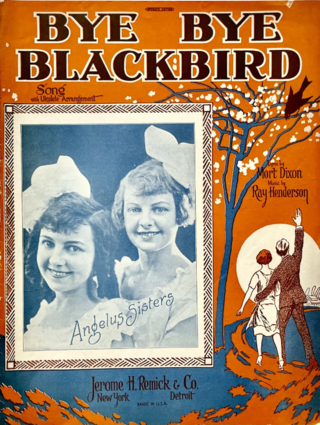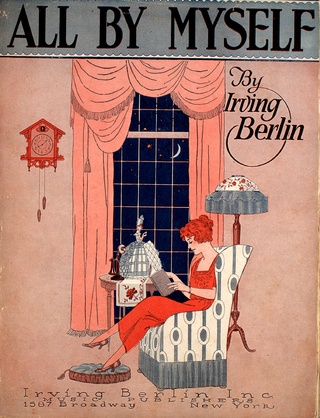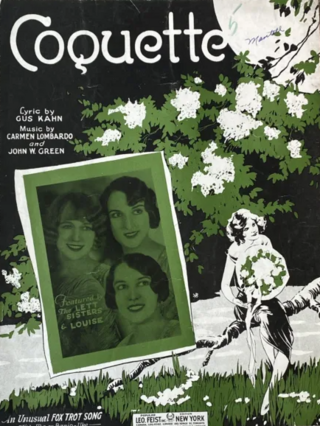Related Research Articles
"If I Give My Heart to You" is a popular song written by Jimmy Brewster, Jimmie Crane, and Al Jacobs. The most popular versions of the song were recorded by Doris Day and by Denise Lor; both charted in 1954.
"Lullaby of Broadway" is a popular song with music written by Harry Warren and lyrics by Al Dubin, published in 1935. The lyrics salute the nightlife of Broadway and its denizens, who "don't sleep tight until the dawn."
"A Hundred Years from Today" is a popular song published in 1933 with music by Victor Young and lyrics by Ned Washington and Joe Young. The song was included in the London production of Lew Leslie's Blackbirds of 1934.

"Bye Bye Blackbird" is a song published in 1926 by Jerome H. Remick and written by composer Ray Henderson and lyricist Mort Dixon. It is considered a popular standard and was first recorded by Sam Lanin's Dance Orchestra in March 1926.
"Too Marvelous for Words" is a popular song written in 1937. Johnny Mercer wrote the lyrics for music composed by Richard Whiting. It was introduced by Wini Shaw and Ross Alexander in the 1937 Warner Brothers film Ready, Willing, and Able, as well as used for a production number in a musical revue on Broadway. The song has become a pop and jazz standard and has been recorded by many artists.

"My Buddy" is a popular song with music written by Walter Donaldson, and lyrics by Gus Kahn. The song was published in 1922 and early popular versions were by Henry Burr (1922), Ernest Hare (1923) and Ben Bernie.
"Dancing in the Dark" is a popular American song, with music by Arthur Schwartz and lyrics by Howard Dietz, that was introduced by John Barker with Tilly Losch dancing in the 1931 revue The Band Wagon. The song was first recorded by Bing Crosby on August 19, 1931 with Studio Orchestra directed by Victor Young, staying on the pop charts for six weeks, peaking at #3, and helping to make it a lasting standard.

"Somebody Loves Me" is a popular song, with music written by George Gershwin, and lyrics by Ballard MacDonald and Buddy DeSylva. The song was published in 1924 and featured in George White's Scandals of 1924.

"The Nearness of You" is a popular song written in 1937 by Hoagy Carmichael with lyrics by Ned Washington. Intended for an unproduced Paramount film titled Romance In The Rough, the studio's publishing division Famous Music reregistered and published the song in 1940. It was first recorded by Chick Bullock and his Orchestra on Vocalion. Despite numerous accounts to the contrary, the song was never scheduled for and does not appear in the 1938 Paramount film Romance in the Dark.
"September in the Rain" is a popular song about nostalgia by Harry Warren and Al Dubin, published in 1937. The song was introduced by James Melton in the film Melody for Two. It has become a standard, having been recorded by many artists since.

"Nobody's Sweetheart", also known as "Nobody's Sweetheart Now" and "You're Nobody's Sweetheart Now", is a popular song, written in 1924, with music by Billy Meyers and Elmer Schoebel, and lyrics by Gus Kahn and Ernie Erdman. The song is a jazz and pop standard.
"I Let a Song Go Out of My Heart" is a 1938 composition by Duke Ellington, with lyrics added by Irving Mills, Henry Nemo and John Redmond. The song became a number one hit for Ellington in 1938. Other hit versions the same year were by Benny Goodman, Jimmy Dorsey, Connee Boswell, Hot Lips Page, and Mildred Bailey. It was performed as part of The Cotton Club Parade of 1938.
"Mean to Me" is a popular song with music by Fred E. Ahlert and lyrics by Roy Turk, published in 1929. Hit versions that year were by Ruth Etting and by Helen Morgan. Ben Bernie and the Hotel Roosevelt Orchestra also recorded what might be the first male version in February 1929 with vocals by Scrappy Albert.

"All by Myself" is a popular song written by Irving Berlin, published in 1921.
"Flamingo" (1940) is a popular song and jazz standard written by Ted Grouya with lyrics by Edmund Anderson and first recorded by singer Herb Jeffries and the Duke Ellington Orchestra on December 28, 1940, for Victor Records. This briefly reached the Billboard charts in 1941.

"Out of Nowhere" is a popular song composed by Johnny Green with lyrics by Edward Heyman and published by Famous Music. It was popularized by Bing Crosby, and was the first recording under his Brunswick Records contract. He recorded it on March 30, 1931 and it became his first number one hit as a solo artist. Crosby also sang it in the film Confessions of a Co-Ed (1931) and in his short film I Surrender Dear (1931). He recorded it again in 1954 for his album Bing: A Musical Autobiography.

"Yours Is My Heart Alone" or "You Are My Heart's Delight" is an aria from the 1929 operetta The Land of Smiles with music by Franz Lehár and the libretto by Fritz Löhner-Beda and Ludwig Herzer. It was for many years associated with the tenor Richard Tauber, for whom it was written. The aria is sung by the character of Prince Sou-Chong in act 2. An American version of the show opened on Broadway in 1946 starring Tauber but it soon closed as Tauber had throat trouble.

"Coquette" is a 1928 fox trot jazz standard. It was composed by Johnny Green and Carmen Lombardo, with lyrics by Gus Kahn. Guy Lombardo had great success with the song in 1928.
"Sweet and Lovely" is an American popular song of 1931, composed by Gus Arnheim, Charles N. Daniels, and Harry Tobias.
"I Never Had A Chance" is a popular song written by Irving Berlin, published in 1934. Popular versions that year were by Eddy Duchin and by Glen Gray & The Casa Loma Orchestra.
References
- ↑ "Blues in My Heart". Jazzstandards.com. Retrieved 13 December 2012.
- ↑ "The Online Discographical Project". 78discography.com. Retrieved December 30, 2017.
- ↑ Whitburn, Joel (1986). Joel Whitburn's Pop Memories 1890-1954 . Wisconsin, USA: Record Research Inc. p. 208. ISBN 0-89820-083-0.
- ↑ "Discogs.com". Discogs.com. Retrieved December 30, 2017.
- ↑ "allmusic.com". allmusic.com. Retrieved December 30, 2017.